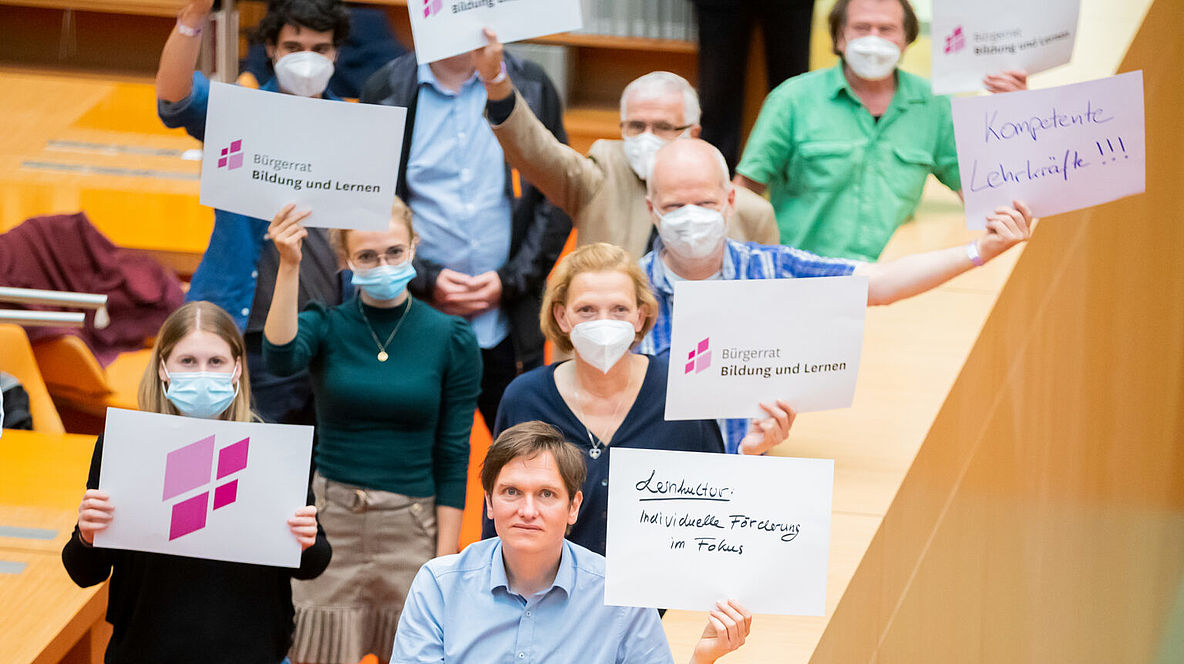Citizens' Assembly wants emergency education programme

Classes starting at 9 a.m., a school subject "life skills", compulsory further training for teachers and age-appropriate co-determination at every school. These are four of eight demands in the emergency education programme for Germany drawn up by the Citizens' Assembly on Education and Learning. The recommendations were presented to the public on 14 December 2021.
In total, the Citizens' Assembly has written down eight major recommendations in its emergency programme. Other demands in it include:
- that each class has a maximum of 20 pupils and two teachers,
- that every school offer all-day care,
- that teachers be better selected,
- that pupils be provided with digital devices,
- that pupils get an insight into different professions, and
- that all pupils get the same educational opportunities.
"This is also how politics can work"
The recommendations of the Citizens' Assembly were developed over the course of a year by more than 500 people randomly selected from all over Germany. Younger people who are directly affected by the education crisis were and still are involved in the multi-stage opinion-forming process. 22-year-old Cynthia Seidel from Halle was also involved. "The big goal of the Citizens' Assembly was to improve education in Germany," she says. To this end, she met and discussed with the other participants several times - online and offline.
"I always had a very negative image of politics because I had the feeling that everyone insisted on their opinion," she says. In the Citizens' Assembly, she says she experienced how many people with different opinions treated each other respectfully. "Every opinion was taken into account, super compromises were made. That's how politics can work," says Seidel.
"Cool to have a say"
Pupils were also involved in the citizens' assembly deliberations. Luis, 12, thinks it's "cool to have a say in how education changes." Lena, 14, adds, "We are the age group most involved in education and learning. It's funny when adults say this or that could be improved. We are involved in this every day and we know quite well what needs to be improved."
Representing politics, Dr. Gerd Landsberg, Chief Executive of the German Association of Towns and Municipalities, was present at the presentation of the immediate programme. "We have to make education policy not for the people, but with the people," he explained.
"People are not disenchanted with politics"
"We always say that people are disenchanted with politics - this example shows that they are not. They want to participate, to get involved. It can never hurt politics to listen to what local people think and feel."
The Citizens' Assembly was organised by the independent and non-profit Montag Stiftung Denkwerkstatt. The aim was for 400 randomly and representatively selected people to find ways out of the education crisis. Important social issues should not only be discussed in parliaments.
What comes next?
The recommendations of the Citizens' Assembly and the children and young people with many ideas are online now. A citizens' summit with representatives of federal, state and local politics, which was postponed because of the COVID-19 pandemic, is to be made up for in the first quarter of 2022.
In the meantime, neither the topics nor the motivation of the participants seem to be exhausted: in a survey among the people who were actively involved in the process, 80 percent said they wanted to continue their involvement in the citizens' assembly.
Read more: